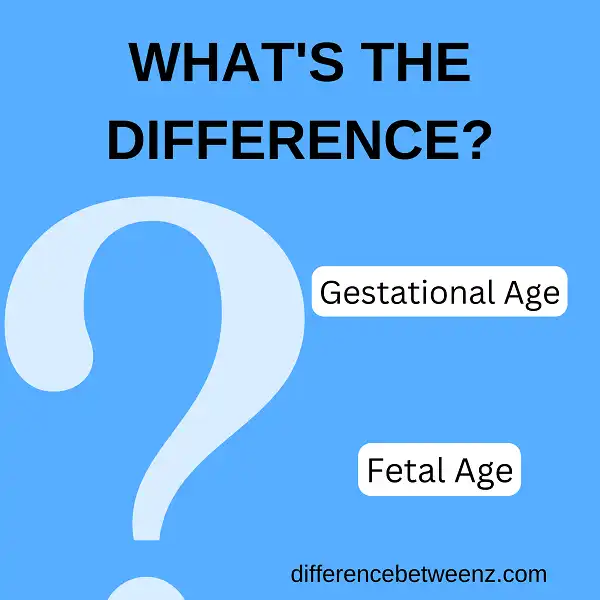When calculating the gestational age of a pregnancy, healthcare professionals use the date of the last normal menstrual period (LNMP). This calculation is based on the assumption that ovulation occurred 14 days after the beginning of the woman’s last menstrual cycle. The fetal age, in contrast, is calculated from when conception actually occurred. A variety of factors can affect when conception occurs, so using LNMP to calculate fetal age can lead to inaccuracies. In this blog post, we will explore some of the differences between gestational age and fetal age. We will also discuss how accurate ultrasound measurements can be in determining fetal age.
What is Gestational Age?
Gestational age is the length of time a baby has been growing inside its mother’s womb. It is measured from the first day of a woman’s last period to the current date. Gestational age can also be determined by ultrasound, which is usually done during the first trimester.
Gestational age is important because it is used to calculate the due date. It is also used to determine how well the baby is developing and whether or not there are any complications with the pregnancy.
If a baby is born before 37 weeks, it is considered premature. Babies born after 42 weeks are considered post-mature. Gestational age is just one factor that determines how healthy a baby will be at birth. Other factors include the mother’s health, the baby’s genes, and environmental factors.
What is Fetal Age?
Fetal age is the length of time that a fetus has been developing in the mother’s womb. It is usually calculated from the first day of the woman’s last menstrual period to the current date.
Fetal age can be determined through ultrasound, which is generally performed during pregnancy. The average length of pregnancy is 40 weeks or 280 days, but Fetal age is not always an accurate indicator of how developed the fetus actually is.
For example, a fetus may be small for gestational age if it is growing more slowly than usual. Conversely, a fetus may be large for gestational age if it is growing more quickly than usual. Fetal age is just one of many factors that can affect a baby’s development.
Differences between Gestational Age and Fetal Age
Gestational age and fetal age are two ways of measuring the development of a baby during pregnancy.
- Gestational age is the number of weeks that have passed since the start of the mother’s last menstrual period.
- Fetal age, on the other hand, is the actual number of weeks that have passed since conception.
- In general, gestational age and fetal age are very close to each other.
- However, there are some circumstances in which they can differ significantly.
- For example, if a woman has irregular periods or conceives later in her cycle, her Gestational Age will be less than her Fetal Age.
- Additionally, if a baby is born early (before 37 weeks), his or her Gestational Age will be less than their chronological age.
Knowing both Gestational Age and Fetal Age can give healthcare providers a more accurate picture of a baby’s development and health.
Conclusion
Gestational age and fetal age are different. Gestational age is the time from the last menstrual period, while fetal age is measured from conception. Fetal age is about two weeks behind gestational age. This means that ultrasounds done during the second trimester will measure fetal age, not gestational age. Knowing this difference is important for the accurate interpretation of ultrasound results.


